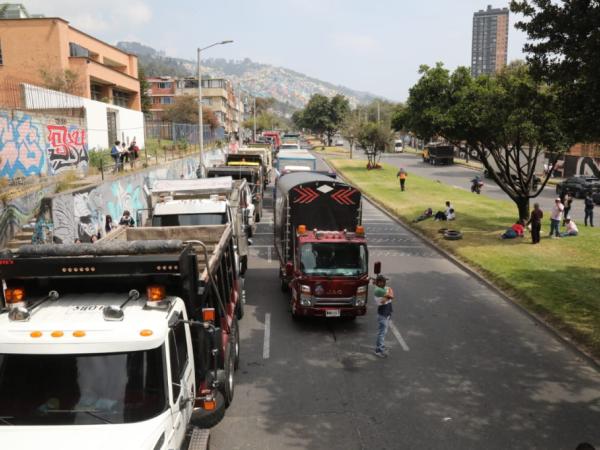The transportation sector has gone through great difficulties in recent years, and with a decreasing demand and damming in the increases of some inputs such as ACPM and tolls, this year its finances have been heavily pressured, and for next year, The outlook would not improve.
You can see: Mintransporte should reconsider contracting the Invir after the Court’s decision
It is worth remembering that, as part of the agreements with cargo transporters in the recent trucking strike, an increase of $800 was determined in the value of the ACPM divided as follows: $400 in September and the other $400 on December 1 of this year, 2024. This increase corresponds to 8.56%. However, this value is less than the initially agreed value of $1,904 initially stipulated by decree.
This determination, although minor, is putting pressure on carrier costsand therefore the prices of land transportation rates and freight charges.
Likewise, so far this year, tolls have increased twice: in January 2024 by 13.12% + 2% for the Fosevi road safety fund and on August 1, 4.64% corresponding to the increase that They stopped doing so in 2023. This implies that, so far this year, the increase in tolls has been 20.46%.
“In this sense, we wonder what would happen to the finances of any economic activity where the cost of inputs grows at 8.56% and 20.46%, in a year where the annual variation of the CPI is at 5. 81%”, José Yesid Rodríguez, executive president of the Association for the Comprehensive Development of Intermunicipal Land Transportation (Aditt), pointed out in this regard.
And although, in the imagination one could believe that these increases could be transferred to the final price of the tickets, with a decrease in local tourism, Companies must be cautious when making this adjustment as it could impact demand even more.
“For Aditt businessmen, this pressure on the operating costs of the sector can generate upward pressure on ticket prices, but since we are not in a perfect market, surely part of that margin will have to be assumed by the carrier with the lowest profitability, the lowest investment and obsolescence of the vehicle fleet”, adds Rodríguez.
Also see: The Government’s railway plan would cost the same as the investment in 4G roads
So far, the Three Kings holiday is the one that has mobilized the most people. The figure amounts to 1.8 million.
Private file
According to figures from Aditt’s Directorate of Studies, for September of this year, The number of passengers transported has increased by only 2.92%. Because up to that date 83.2 million passengers had been transported, compared to the figure for the immediately previous year where 80.8 million had been transported on that date.
In the case of cargo transportation, Nidia Hernández, president of Colfecar, assures that the panorama is no different. It states that the country is facing a worrying panorama and the income of the sector has been affected due to the aggressive drop in cargo volumes due to the behavior of the economic sectors that demand the transportation service. Added to this dynamic are the operating costs that have been putting pressure on the sector’s margins, taking into account that only fuel weighs 40% of them and tolls 11.8%.
“Particularly regarding tolls, we are concerned that so far this year they have already increased by 18.15%, adding the increases that were already made in January and August; But to this must be added the increase that is still pending of 4.64% in December corresponding to the adjustment that they had to make at the beginning of the year. And in January of next year, the tolls under the jurisdiction of INVIAS would increase as inflation closes this year, according to the Bank of the Republic this would be 5.5% and the tolls under the jurisdiction of the ANI according to each contract. signed between the government and the concessions. That is, we estimate that between January 2024 and January 2025 the increase in this item would be 30%,” point.
In fuels, they are concerned not only about the following fuel increases but also that if the financing law is approved, The carbon tax paid for each gallon of Diesel would go from $190 to $677, which implies an increase of $487 that was not considered within the agreement with the transport bases, therefore, “If this law is approved, the accumulated increase in the price of diesel would also be $1,287 in less than a year,” says.
What’s next?
Among the agreements that were established during the truckers’ strike, the Government committed to making structural adjustments in the sector that allow them to transfer these costs efficiently and avoid ‘rate negotiation’ below the Sice-tac (stipulated freight value by the Ministry of Transportation). However, the impact that this could have on inflation would be worrying, and even more so considering that if this system is adjusted in the coming months, the value of the ACPM could be raised again in February. The value that the Government would have to raise to make the price par with the international price is $5,200.
See also: Traffic accident? With this application you can solve it in 15 minutes

Medellín, Bogotá, Cali, Villavicencio and Duitama are the cities with the most passenger traffic.
Private file
Given this, Rodríguez is very worried, because in itself, Finances are already quite tight and the sector is ‘in intensive care’.
“We are facing a government in need of resources and no explanation about the fact of being a producing country was sufficient to make Colombians pay the price of an international reference that does not correspond to the country’s production and refining costs. “The economic situation of the transportation sector is in intensive care and any increase that is made will only further deepen the crisis of companies, owners and drivers reflected in the generation of employment in the sector,” Rodríguez points out.
With all this situation, he considers that the viability of the sector is at risk. “It is the same State that is leaving the viability of an essential public service such as road passenger transportation at risk. The State has not wanted to understand that this is a sector that continues to work with records that do not reach 80% of the pre-pandemic data and that is losing passengers and competitiveness due to rampant informality and the absence of controls for any system that avoids payments on labor costs of social security and associated with civil liability that protects the user and the citizen.”says the president of Aditt.
Due to the aboverates should increase above 12%but due to the factors mentioned above, only between 6% and 7% will do so so as not to further impact demand.
In the case of cargo transportation, even with uncertainty about the increases, financial difficulties are projected, taking into account that contracts are signed for 12 months.
“The viability of the sector is already at risk, considering that in addition to the increase in the value of the most representative costs and the decrease in cargo volumes, we are facing other problems that are structural in the sector and whose state has been deteriorating or without a clear solution from the government,” Hernandez adds.
PAULA GALEANO BALAGUERA
Portfolio Journalist


















